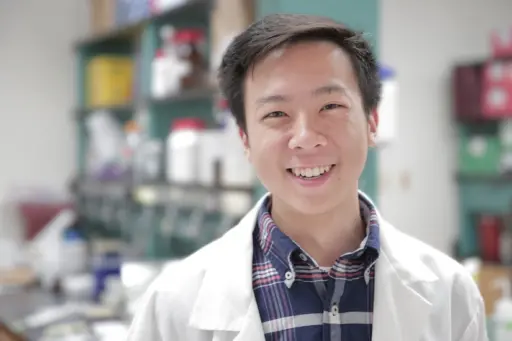Nathan Wang likes to stay busy. During the four years he spent at James Madison Memorial High School in Madison, Wisconsin, he was in after school clubs virtually every day: volunteering in the community with the Spartan Youth Service; practicing his public speaking skills; or writing and editing articles for the student newspaper, to name a few examples. He also tutored younger students one-on-one in math and Spanish.
Summer didn’t slow him down, either. At the University of Wisconsin-Madison, he began his first research internship in the laboratory of Chemistry Professor Gilbert Nathanson the summer after his high school junior year. For his second internship, he chose the lab of Lih-Sheng (Tom) Turng, the Kuo K. and Cindy F. Wang and Vilas Distinguished Achievement Professor in mechanical engineering, at the Wisconsin Institute for Discovery. Before he had even completed his freshman year at UW-Madison in spring 2016, he was on his third lab rotation with Sean Palecek, the Milton J. and A. Maude Shoemaker Professor in chemical and biological engineering.
Given these early research experiences and the advanced and honors courses in chemistry, mathematics and physics he took in high school (including four college-level classes at UW-Madison), the professors who nominated him for a prestigious astronaut scholarship in February 2017 may have been less surprised than Wang himself when he learned in June 2017 that he would receive it.
“I was traveling in Europe with my two older sisters and had just arrived in Vienna when I found out that I had been selected,” Wang says. “It certainly made our trip even more memorable!”
 Nathan Wang
Nathan Wang
Originally established more than 30 years ago by the six surviving astronauts of NASA’s Mercury Seven mission, the Astronaut Scholarship Foundation awards merit-based scholarships to the best and brightest university students in science, technology, engineering and mathematics (STEM) programs. Wang received the scholarship at a ceremony in Washington, D.C., in September 2017.
He credits both family and high school teachers with nurturing his early interest in STEM fields. His dad earned a physics PhD from UW-Madison and met his mom, now an oncology nurse at St. Mary’s Hospital, while both were in graduate school; his middle sister graduated from UW-Madison in May 2017 with a major in biochemistry and is now in medical school at Hofstra University; his oldest sister is a graduate student in applied linguistics at Columbia University.
Wang says his freshman chemistry class at Memorial was the first time he encountered challenging science topics because his teacher, Ann Comins, went well beyond the standard curriculum, even for advanced students. Similarly, his math teachers, Alesha Yahr and Joseph King, insisted on manual calculations for solving definite integrals in calculus classes.
That extra labor paid off for Wang at UW-Madison, where he not only excelled in his computer programming classes, but also found himself (more than once) writing code at 4 a.m. in Engineering Hall.
Combining his passion for dry lab programming with the study of chemical processes in living organisms that fascinates him in the wet lab, he is now double-majoring in chemical engineering and biochemistry, with a certificate in computer sciences.
“I chose chemical engineering because I love its focus on chemistry applications in the real world,” Wang says. “The theory is all fine and good, but at the end of the day, it’s the applications that motivate engineering students like myself.”
Palecek’s lab turned out to be a perfect fit for his emerging interest in studying biological systems with both computational and experimental methods at the macroscopic and microscopic level.
With Palecek’s guidance, Wang and postdoctoral fellow Myung-Ryul Lee are analyzing the chemical underpinnings of antimicrobial drug candidates—specifically, a group of peptides whose first member was discovered in the skin of an Australian frog and turned out to have both antibiotic and anti-cancer activities. Figuring out how to chemically alter these peptides to give them desired medical properties is the kind of challenge that Wang thrives on.
“Antimicrobial peptides bind to cell membranes rather than specific chemical receptors, which reduces the chance that the disease-causing bacteria or fungi we want to eliminate will develop drug resistance,” Wang says. “But the downside is that they are less selective than existing antibiotic drugs, so we want to modify their molecular structure to make them more selective.”
To that end, Wang decided independently to try to predict the activity and specificity of antimicrobial peptides from their molecular sequence and structure, by implementing mathematical and statistical models he had found in a research paper.
“I would like to stress that this idea was Nathan’s,” Palecek wrote in his letter of recommendation for the astronaut scholarship. “I have never had an undergraduate propose a new, independent idea before. He has an excellent grasp of the important questions and techniques and is very creative and innovative, with a level of maturity I have never seen in a student at this stage.”
Wang’s research project also helped him appreciate the intimate connection between classroom material and lab strategy. When a fellow chemical engineering student asked in a recent class just why they had to solve a challenging programming problem with the software MATLAB, Wang was able to share a perfect example of how these skills were helping him answer specific research questions in the lab.
His long-term plans aren’t set in stone yet, but a career that includes research is a strong possibility.
“I like that chemical engineering gives me multiple career options in both industry and academia since I’m not sure yet what kind of job I want to pursue,” Wang says. “But I really enjoy the kind of research I do in Professor Palecek’s lab and definitely plan to go to graduate school next.”
Adds Palecek: “I have no doubt that Nathan will develop into an outstanding researcher and will quickly become a leader in our field.”